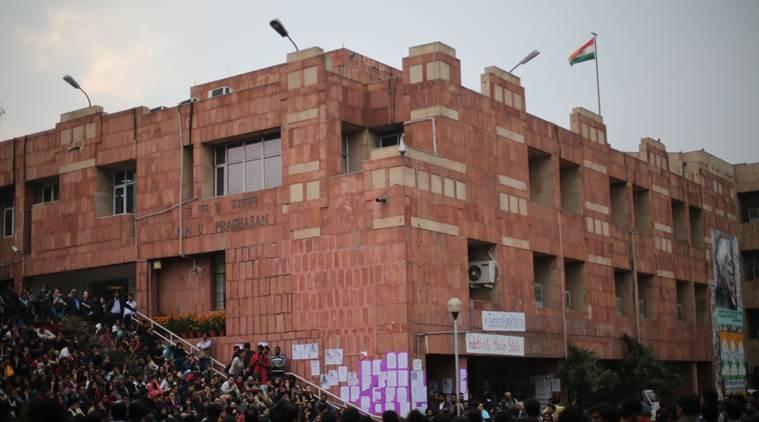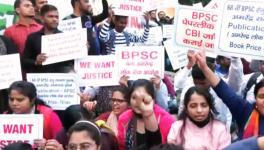Following Teachers’ Protests, CCS Rules Revoked from JNU

In an enormous win for the protesting teachers and students of Jawaharlal Nehru University (JNU), the arbitrary imposition of the Central Civil Services Conduct rules (CCS) has been taken back by the JNU Vice Chancellor.
Announcing the win for academic freedom, the JNUTA released a press note stating, “In a press-note released after the 276th meeting of the Executive Council held today, the JNU administration has clearly stated that these rules have not been incorporated in the JNU ordinances. JNUTA had already raised objections to such imposition of a set of rules, which are against the very nature of an academic institution. Along with JNUTA, other teachers’ organisations had also raised objections to such an imposition. This has forced the administration to backtrack its earlier decision of incorporating the CCS rules in the ordinances.”
Move to ‘Muzzle Voices of Professors’
Vice Chancellor M. Jagadesh Kumar, in the 147th academic council meeting held on October 5, adopted ordinances related to the new University Grants Commission (UGC) regulations which included the implementation of CCS rules for faculty members. The imposition drew flak from all quarters and is being seen in line with the Narendra Modi led government’s attempt to aggressively clamp down on spaces of dissent. Speaking with NewsClick, Professor Surajit Majumdar stated that, “It is very clear that the imposition of the rules are an attempt to muzzle the voices of the professors.”
Also Read: Forcing CCS Rules on Central Varsities: Bad Governance, Bad in Law
The JNUTA has been vehemently protesting against the imposition of the rules terming it as "absurd, illegal and unconstitutional". The imposition of Central Civil Service Conduct Rules of 1964 would have implied that the professors of central and state universities are government servants and therefore, the professors must not critique the government or the administration. Moreover, the move restricts the participation of the professors in any political activity and publishing anything that may be deemed unfavourable by the government. The dictatorial policy also imposes restrictions on the discussions employees have with the press.
The go ahead given to the move previously was, thus, seen as one that is against the very spirit and the essence of an university - one that fosters critical expression.
Sharing the news of CCS rules being shunted out of JNU, Ayesha Kidwai, Professor in JNU said, “Battle is far from over on this matter, and must go on until the UGC letter is withdrawn. These rules have come into force in many Central Universities and we must all fight to ensure they are disallowed from every university.” She added, “Our victory was expressed in the form of a mealy mouthed press release in which the JNU VC is said to ‘have confirmed that no CCS Rules have been incorporated into the Ordinances’. Behind this churlish statement, of course, lies a huge tale of humiliating defeat of the JNU administration, who had actually already issued show cause notice under the CCS Rules for 48 of us.”
Procedural Violations Plenty
The process of the imposition and the basis of it have repeatedly been challenged by the students as well as the teachers. JNUTA had claimed that the new set of UGC rules were passed by the AC without any discussion with the faculty members. The teachers also highlighted that the rules were not proposed with prior information to the faculty members. Procedurally, the matters of discussion at the AC meeting have to be first circulated among all the stakeholders which are then debated in the council. However, this was not done in this case. Discrepancies in the process were further exposed as four pages of (proposed) changes to the circulated draft ordinances were suddenly tabled as editorial changes, but some of them involved major, highly important changes. Overlooking all opposition, the VC “rebuffed” all such suggestions and passed the regulations provisionally.
Also Watch: Civil Services Code- 'An Attempt to Clamp Down Critical Expression in JNU'
Crackdowns of the JNU administration and its attempts to shroud academic processes in silence have been on a rise in the past two years, since the appointment of the VC in 2016. Speaking with NewsClick, N. Sai Balaji, JNUSU president said, “This is a major victory for students and teachers, and our collective resistance. However, the battle is far from over. Even after the VC’s declaration, there is a possibility of attempts being made to ensure the implementation through other channels, Nevertheless, our movement will go on.”
Get the latest reports & analysis with people's perspective on Protests, movements & deep analytical videos, discussions of the current affairs in your Telegram app. Subscribe to NewsClick's Telegram channel & get Real-Time updates on stories, as they get published on our website.























